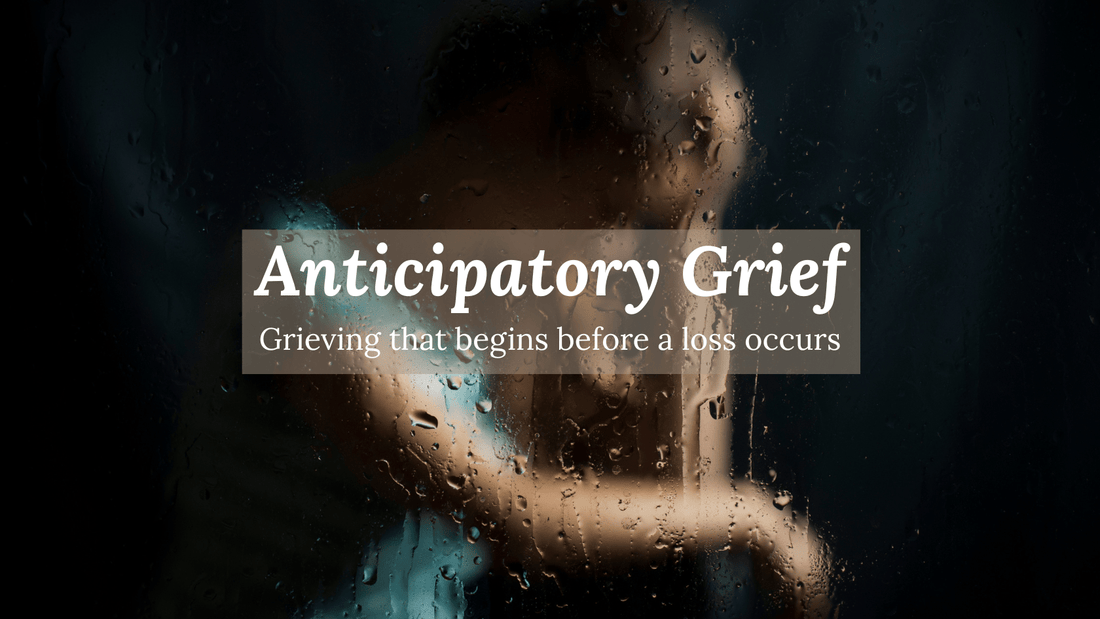
Grief Doesn’t Begin at Goodbye: Living Through Anticipatory Grief
Share
Anticipatory grief stirs up a wave of emotions—anxiety, sadness, even anger—as we begin mourning before the goodbye has come.
What is anticipatory grief?
It’s the grief that begins before a loss happens—when we’re faced with the reality that someone we love is nearing the end of their life. It’s grieving in the in-between, while they’re still here, and it brings its own kind of heartache. Anticipatory grief is a different kind of ache. It’s a roller coaster of emotions that hits when you’re watching someone you love slowly slip away. It brings with it waves of sadness and tears, but it’s so much more than that. You might feel:
- Anger or resentment, even when you don’t want to
- A deep loneliness, even when surrounded by people
- Anxiety or depression that comes and goes in unpredictable ways
- Guilt—for what you’ve said, haven’t said, or can’t do
- A strong need to talk, to remember, to process
- Overwhelming fear—of what’s coming, of saying goodbye, of the unknown
- Exhaustion, physically and emotionally
- Emotional numbness—feeling detached from it all
- Trouble concentrating, or forgetting simple things
These feelings can come all at once or sneak up slowly. One minute, you might feel a spark of hope—maybe they’re having a good day, laughing, smiling, eating. The next, you’re knocked down by fear and helplessness because everything changed overnight.
I’m living this now. My Dad is in hospice. What makes this even harder is that we live in different states. I went to see him recently, and the first night I arrived, I barely recognized him. He was out of it, and I honestly thought that morning might never come. But then it did. And he was awake—really awake—chatting, joking, still being himself. It was more than I expected, and I was so grateful for that gift. I truly believe my Mom—my angel from above—gave me this gift of time with him. She knew I needed it as well as my Dad did.
I brought one of my dogs with me—Evie—and my Dad was so happy to see her. She jumped right up onto his bed and laid right next to him, like she knew he needed her comfort. He smiled as he pet her, and I watched as she nudged his hand, asking for more love. It was one of those moments I’ll never forget. A quiet kind of connection that said so much without words.
As I said goodbye and told him I'd see him soon, my Dad called Evie back up onto the bed. She sat right next to him, and then she kissed him—again and again. My heart shattered, but it was also so full. She knew. And in that moment, she was loving him in the most beautiful way.
We had a good week. A week full of hard conversations. Of making calls to old friends. Of laughing through tears. Of feeling the weight of what’s coming but trying to be present in the moment. Every moment felt heavy. Everything I did was hard. And as the week came to an end, I thought the hardest part was behind me.
But leaving? That was the hardest part of all.
I asked him if he was upset I had to go. He wasn’t. He understood. He told me he was glad I came. I told him I’d be back in a few weeks. But the question that haunts me is: Will I make it back in time?
The guilt of leaving... it’s been eating me alive. But life at home was calling. My responsibilities, my family, my work. And so, I drove away with a lump in my throat and a heart heavy with the unknown.
 This photo was taken the morning I was leaving.
This photo was taken the morning I was leaving.
It’s knowing what’s ahead, but not knowing when.
It’s mourning the moments that haven’t yet happened.
It’s being stuck between preparing to say goodbye and holding onto what time is left.
I’m sharing this not just to write about it—but to remind anyone else walking this path: you’re not alone. If you’re navigating this same fog, I see you. It’s raw. It’s exhausting. And it’s real.
Anticipatory grief is a part of love. A hard part. But it’s love just the same.
And right now, I’m living it one moment at a time.
- Express your pain – Talk or visit with family, friends, or healthcare professionals, such as hospice staff or a counselor. You don’t have to carry this alone.
- Take care of your physical and emotional health – Prioritize rest, nourishing meals, and movement. Even small efforts to care for yourself matter.
- Spend time together now – Be present. Listen without judgment. Share stories. Let them talk. These moments are precious.
- Stay informed – Consider seeking books, blogs, or caregiver support communities to help guide you through this time.
- Practice love, forgiveness, and letting go – If it feels right, say the things you’ve been holding back. Let your loved one know it’s okay to go—and that you’ll be okay, too.
No matter when or how grief shows up, know this: it’s valid. It’s normal. And it’s okay to ask for help. Whether through a support group, a trusted friend, or a professional, you don’t have to walk this path alone.
Even when a loss is anticipated, it doesn’t make the goodbye any easier. Grief takes time. It can be chaotic. And it looks different for everyone—but you are never alone in it.


If you're looking for extra support, one resource is the book Expected Loss: Coping with Anticipatory Grief (Words of Hope and Healing). It offers gentle insights and encouragement for those of us grieving before a loss. You can find it here: https://amzn.to/43OnTlL
